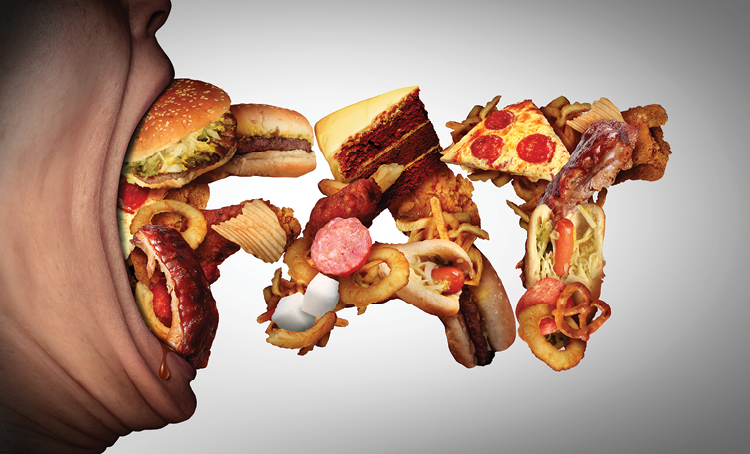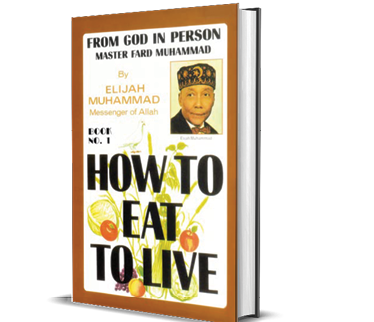The Honorable Elijah Muhammad, in his life-saving two-volume book, “‘How To Eat To Live: From God In Person Master Fard Muhammad,” has for more than 50 years been teaching the benefits of eating natural foods at the proper times for prolonged life and good health.
“The Honorable Elijah Muhammad taught us a method of ‘How To Eat To Live,’” the Honorable Minister Louis Farrakhan stated in an article he wrote titled “The War Against Obesity (Fat).”
“The scholars and scientists of nutrition are now bearing witness that the Honorable Elijah Muhammad was far ahead of the entire world of medical science on proper diet and eating habits (one meal a day),” the Minister wrote in part 1 of a 1991 series published in The Final Call.
A new study indicating that ultra-processed foods are linked to cognitive decline and stroke, with elevated risks in Black people, joins those bearing witness to the Honorable Elijah Muhammad’s divine dietary guidance.
Long-term consumption of ultra-processed foods—foods altered with additives and preservatives, which have become staples in the diets of countless Americans—are associated with an increased risk of stroke and cognitive impairment, according to researchers at Massachusetts General Hospital.
Their study, “Associations Between Ultra-Processed Food Consumption and Adverse Brain Health Outcomes,” published May 22 in the Neurology Journal, found a 10 percent increase in relative intake of ultra-processed foods was associated with higher risk of cognitive impairment and intake of unprocessed or minimally processed foods with lower risk of cognitive impairment.

The researchers also found that eating more minimally processed or unprocessed foods was associated with commensurate improvements in brain health and reductions in serious neurological outcomes.
“It’s about time! They’ve been knowing about this processed food and how it causes all different types of problems, in particular diabetes and cancer—why people are so overweight,” stated Dr. Ridgely Abdul Mu’min Muhammad, farm manager of the 1,556-acre Muhammad Farms in Southwest Georgia.
“They’ve been knowing this, that the food is depleted of nutrients, and they’re putting stuff in it to make you addicted to it, so people keep eating and you’re just blowing up,” continued Dr. Ridgely Muhammad. He added that there is only one solution, to eat as the Honorable Elijah Muhammad said to eat. He said that includes whole wheat which is good for consumption.
According to researchers, ultra-processed foods include packaged baked goods and snacks, fizzy drinks, sugary cereals, ready meals containing food additives, dehydrated vegetable soups, and reconstituted meat and fish products. They are often highly saturated with added sugar, fat, and/or salt, but lacking in vitamins and fiber, and are thought to account for around 25-60 percent of daily energy intake in many countries, researchers further indicated.
The study further found that increased consumption of ultra-processed foods resulted in a nine percent higher risk of stroke and a 12 percent increased risk of cognitive decline, and that the association between ultra-processed foods and stroke was greater among Black participants (15 percent increased risk), possibly reflecting this group’s higher incidence of hypertension.
In addition, researchers looked at specific diets that encourage fresh fruits and vegetables while minimizing red and processed meats, and found they were independently associated with reduced risk of stroke and cognitive decline, noted lead author Varun Bhave of Harvard Medical School.
“While our study clearly sounds a warning, it also provides hope that there are things we can do as individuals and which policymakers can do on a national scale to reduce UPFs (ultra-processed foods) from our daily diets,” stated W. Taylor Kimberly, M.D., Ph.D., chief of the Division of Neurocritical Care at Massachusetts General Hospital, and senior author of the study.
“As we found, even incremental changes are associated with a significant difference in improving our brain health, along with lowering our risk for stroke and cognitive decline,” she said.
In “How to Eat to Live,” Book 1, the Honorable Elijah Muhammad states about processed foods:
“Take time and prepare your own foods. Do not kill yourselves by running to the store buying processed foods to eat and never buy those ready-made biscuits.”
“Pastries and cakes—the kind made with crusts of white flour and sweetened with white sugar, so sweet you can still taste them the next day, are not good for our stomachs. All this hastens you to the graveyard sooner than you would like to go.
We should eat fruit and fruit pies. I love that little black blueberry pie; huckleberry, as we call it in the South. But do not make it with white sugar or crusts of white flour. Use brown sugar and whole wheat flour for your pie and cobbler crusts,” he wrote.

“Eat whole wheat, but not the whole grain, it is too much for the system. Eat wheat, never white flour, which has been robbed of all its natural vitamins and proteins sold separately as cereals. You know, as well as I that the White race is a commercializing people and they do not worry about the lives they jeopardize so long as the dollar is safe. You might find yourself eating death, if you follow them,” the Messenger continued.
In addition, the Honorable Elijah Muhammad advised against even drinking a lot of soda pop.
“Some intelligent people will not drink one bottle of soda pop,” he wrote.
“Not only is this high processed food bad for you, as a matter of fact, they’re telling you shop around the outside of the supermarket, where the fresh vegetables and dairy products are. Stay out of the center of it with the processed foods,” stated Dr. Ridgely Muhammad.
The study’s researchers may really care and are informing some, but others have been long aware and experimenting on these things to purposely destroy people’s health, stated Dr. Akili Graham Muhammad, a general family physician.
“There’s really a dichotomy to an article like this and to me, all we have to do is take a general view of history of Black people in this country and we know that that article is true,” he said, referring to the study.
For example, he said, the first time his grandmother ever went to a grocery store was when she was 49 years old. She was born in 1905, so for the majority of her life, she grew her own food, he said.
“We definitely have to pause and take a look at the destruction of Black people’s health. … In slavery, we were very malnourished, very sickly. We were dying at a young age. The average age of a Black person in America towards the end of slavery was 27 years old,” said Dr. Akili Muhammad. When Black people were so-called freed, their life expectancy tripled into the 60s, but that changed when they had to depend on grocery stores for food, he continued.
“Our life expectancy has been coming back down and the disease processes have been skyrocketing in our community,” added Dr. Akili Muhammad.
He believes that grocery stores are laid out by design and are a factor in Black people’s need to shop according to savings, coupons, tastebuds and colors. He explained that certain packaging colors tend to steer people in the wrong direction as opposed to planning, understanding and making good choices, as the Honorable Elijah Muhammad is trying to teach us to do, explained Dr. Akili Muhammad.
“This whole idea of processed foods has been a scientific experiment and now scientific know-how for as long as many of us have been alive.” See “How To Eat To Live,” on page 28 of The Final Call. Visit store.finalcall.com to order “How To Eat To Live,” Books 1 and 2.













